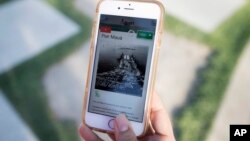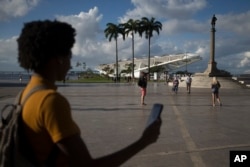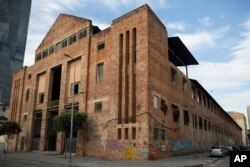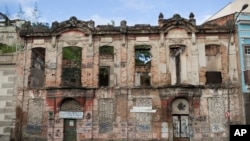Rio de Janeiro's port area may be one of the city's most inviting spots since being renovated for the Olympic Games last year. But while the area is home to attractions that include two museums and an aquarium, its rich history remains unknown to most locals and tourists.
A new app seeks to educate visitors about the area's role in Brazilian history, from colonization and the arrival of slave ships to recent cases of corruption.
Launched in late June by the nonprofit investigative journalism agency Agencia Publica, the app called "Museum of Yesterday'' offers tours of the port in Portuguese and English.
But there's a catch. Inspired by Pokemon Go, the app detects users' geo-location and only reveals the stories once users arrive at the location where the story took place.
With over 160 points of interest, the app offers five options. The terror tour explores slavery, colonization and the country's military dictatorship, along with other incidents like the 1993 Candelaria massacre in which eight people — many of them teenagers — were killed while sleeping on the steps of the Candelaria church. The corruption tour investigates bribery from the time of King John VI of Portugal to recent kickback schemes. The samba tour explores the roots of Rio's traditional Carnival music. Finally, the tour of ghosts explores important historical figures that are sometimes forgotten.
"Rio's port carries a lot of the history of Brazil,'' said Gabriele Roza, a journalist at Agencia Publica who contributed to the stories in the app. "What we realized was that these stories are not present here.''
Indeed during the Rio Olympic Games, local authorities emphatically promoted the port's new attractions such as the futuristic looking Museum of Tomorrow designed by Spanish architect Santiago Calatrava that cost $55 million, and a new boulevard decorated by internationally acclaimed street artists.
But the city neglects other historical attractions located a few blocks away such as the Valongo Wharf, an archaeological site where hundreds of thousands of slaves debarked after their harrowing journey across the Atlantic.
Francesca Declich, an Italian anthropologist visiting the Valongo Wharf on July 9, the day it was named a UNESCO World Heritage site, complained that the wharf was hard to find and that there was only basic information available on a three-paragraph-long plaque next to the pit.
The port is also connected to the present-day Car Wash corruption investigation. For example, Eduardo Cunha, who led Brazil's impeachment effort against former President Dilma Rousseff, is now being investigated over allegations that he received $16 million in kickbacks related to the port renovation, which cost the city of Rio over $4 billion.
Rio's former mayor Eduardo Paes is also being investigated for taking bribes in the port renovation. Despite the scandal, the revitalized area is considered one of the few positive legacies from the Rio Olympics.
The app, which has been downloaded over 2,000 times so far, tells these and other stories through text but also through illustrations, photographs, audio, videos and a map from the 1830s when most of today's port was still ocean.
"As you start walking along the port area you can actually capture the stories from Rio's past and put them in a vault,'' explained Mariana Simoes, another journalist from Agencia Publica who was part of the team that developed the app.
"You are actually being encouraged to walk and discover the area, discover these elements of our past as you walk through them.''







